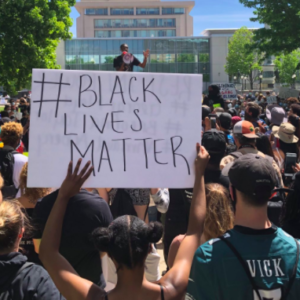Modern generations come of age during tumult.
For my parents, adolescence was marked by second-wave feminists and AIDS protesters. For my grandparents, who emigrated to the United States at the height of the Vietnam War, it was navigating a nation rocked by the civil rights movement and the struggle for peace.
For my generation, Black Lives Matter is the tumult.
As a child, I watched Ferguson, Missouri, burn for weeks. I saw Tamir Rice’s face flash across my television, just two years younger than me when he died. Then it was Eric Garner, Alton Sterling, Philando Castile, and on and on and on.
Young people ache for a better world, and though many of us have never had to live in fear because of our skin color, we remain indignant for those who do. I have friends who have been teargassed this week but still return to the frontlines because they feel they must.
And those who can’t join the fight in the streets have raised hell on social media, turning their accounts into advocacy platforms demanding change. While evil in the world disheartens Gen Z-ers, at the same time it enlivens and emboldens us to organize, demonstrate and resist.
We remember the names of police brutality victims for the tragedies they represent — the lives cut short and the children orphaned. We don’t share videos of black men dying in the streets out of morbid fascination. We do it because the outrage should be as powerful as the crime.
We mobilize for those who can’t because we’d want others to do the same for us if our roles were reversed.
I find myself surrounded by young people who take care of each other despite seemingly insurmountable differences. Practically every friend of mine has an identity that leaves them vulnerable to the world, be it their race, sexuality or gender. And an attack on someone else’s vulnerability, even if it differs from our own, to us feels like a threat.
We see injustice, however specific it may be, as a common struggle.
This collectivism is the central strength of the young folks I’m privileged enough to know. I’m a member of America’s youngest, most ethnically diverse generation, a group of people defined by their activism and tolerance. Take a look at the photographs coming out of Minneapolis, Atlanta, Detroit and so many other cities across the nation, and you’ll quickly realize that the demonstrating crowds are far from homogenous.
People like me don’t die in the streets in broad daylight pinned to the ground by an officer’s unforgiving knee. But people like me don’t care about that divide.
David Barr, a tireless participant in the AIDS protests of the 1980s, perhaps put it best when he said: “Rallying together and expressing our anger was a really good replacement for just feeling scared all the time. … The anger is what helped us fight a sense of hopelessness.”
I don’t know how we maintain our optimism half the time. Is it a side effect of our youth, some brand of naivete that we haven’t yet relinquished? Will there come a point when we’ve seen one too many executions, when we begin to forget victims’ names, when the tragedies lose their meaning? Will we become desensitized?
I don’t retain any great hope that the senseless killings of black men will stop, but I’m certain that people my age will stay upset, and will raise their voices for those who can’t, for fear of repercussions, or because they simply aren’t around to tell their stories.
We do it for them, and we do it for the activists who’ve mobilized for generations to fight the powers that be.
Recent news coverage is dominated by stories about protests gone wrong. And while that angle is undoubtedly important, and while we should remain committed to protest mechanisms that keep people safe, those considerations shouldn’t overshadow the reasons young people mobilize.
Looking solely at the aftermath compels us to neglect the long, tortured path that brought us to this point.
The only thing more tragic than continued injustice is the day we’re no longer enraged. By staying angry, we retain hope for a day when the protests need not be as prevalent, as furious, or as disruptive.
Until then, we’ll stay loud.

